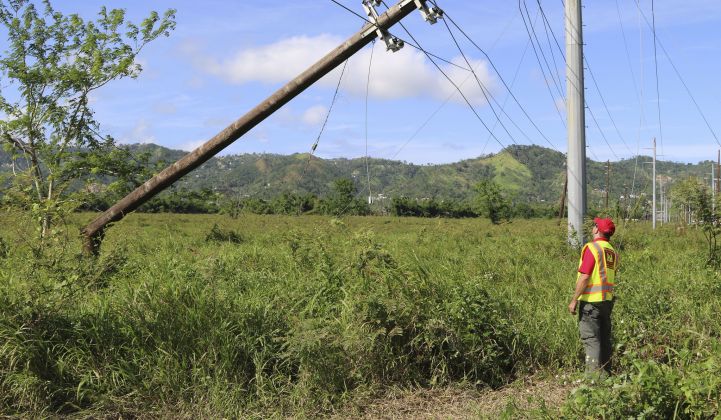A report out Tuesday in the New England Journal of Medicine claims the Hurricane Maria-related death toll in Puerto Rico exceeds the official tally by over 70 times. Researchers said those results were likely conservative.
The official death toll is 64.
It’s not the first time outside bodies have challenged the government’s official mortality figure, but the study once again underscores the devastating impacts that loss of electricity and delays in restoring power have had on Puerto Ricans. According to the island’s electric authority, 13,000 customers remained without electricity on May 29. Atlantic hurricane season begins June 1.
The study’s results were bleak. The 4,645 “excess deaths” described by researchers represents an increase of 62 percent in the mortality rate compared to the same period, September 20 to December 31, in 2016.
Authors found that, on average, households endured 84 days without electricity. In the most remote areas sampled, 83 percent of households did without electricity during the entire time period covered by the study. The authors note that at the time of data sampling, many respondents were still without power and water.
Most respondents cited an inability to get medicine and the inability to use respiratory and other equipment that relies on electricity as threats to health. Respondents also noted damaged roads and transport issues, among other challenges.
Previous reporting has highlighted a dramatic 29 percent spike in the suicide rate between 2016 and 2017, with a bump after Hurricane Maria, as well as the discrepancy between official reports of death and independently tabulated numbers.
In November, for instance, researchers published an analysis that suggested the death toll related to Hurricane Maria may exceed officially reported numbers by a factor of 10. In December The New York Times cited over 1,000 deaths after an independent analysis of data. This most recent figure is the highest.
The situation in Puerto Rico is dire, but it is not entirely isolated. Past research from organizations including the World Health Organization and Sustainable Energy for All have discussed the concrete link between electricity access and health.
In a report last year, Sustainable Energy for All noted that over 3 billion people still use solid-fuel — like wood and dung — powered cook stoves, which have adverse health impacts, especially for the woman who most often use them. Air pollution from these stoves kills 4 million people prematurely each year, mostly women and children.
The United States Agency for International Development has also pointed out a correlation between electrification and lower rates of gender-based domestic violence, in part because of the economic and educational agency electricity offers to women.
The United Nations, aid groups, countries and businesses are also working on ways to bring clean energy to refugee camps, where 90 percent of people typically don't have access to electricity.
In 2016, Greentech Media explored many these issues related to sustainable development and power in a documentary focused on Haiti.
Puerto Rico’s case is unique in that it’s a territory of a highly developed country where the overwhelming majority of citizens have electricity access. The U.S. government response to the disaster in Puerto Rico has been severely criticized. A Politico investigation published in March described how the federal government’s response to impacts from Hurricane Harvey in Texas far exceeded help provided to Puerto Rico after Hurricane Maria.
Now, as residents along the Atlantic are gearing up for another season that the National Oceanic and Atmospheric Administration predicted last week to most likely be near-normal or above-normal, the Puerto Rican government says it's better prepared to confront upcoming storms.
But the grid is not yet fully repaired. The U.S. Army Corps of Engineers remains on the island, but federal crews are no longer engaged in linework.
Cobra Acquisitions LLC, a subsidiary of Mammoth Energy Services that’s been working on the island since October, announced Tuesday it had secured a one-year, $900 million contract with the Puerto Rico Electric Power Authority to continue working on grid reconstruction.
Along with the notorious Whitefish deal, critics have scrutinized Cobra’s contracts with PREPA and questioned whether the company has adequate experience. Last month, a Cobra subcontractor caused an island-wide blackout.
In a statement on the contract, Cobra CEO Arty Straehla said the company is “very proud” of the work it had done on the island. He noted that the grid reconstruction is expected to take several years.
Watch the Empowering Haiti mini-doc here:




